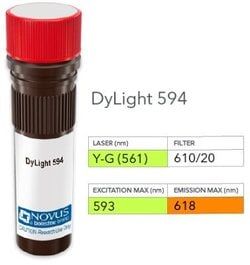AIF-1/Iba1 Antibody (rAIF1/1909) - Azide and BSA Free, Novus Biologicals™
Manufacturer: Novus Biologicals
Select a Size
| Pack Size | SKU | Availability | Price |
|---|---|---|---|
| Each of 1 | NBP275760-Each-of-1 | In Stock | ₹ 57,494.00 |
NBP275760 - Each of 1
In Stock
Quantity
1
Base Price: ₹ 57,494.00
GST (18%): ₹ 10,348.92
Total Price: ₹ 67,842.92
Antigen
AIF-1/Iba1
Classification
Monoclonal
Concentration
0.2 mg/ml
Dilution
Immunohistochemistry-Paraffin 1-2 ug/ml
Gene Accession No.
P55008
Gene Symbols
AIF1
Immunogen
Purified recombinant human AIF-1/Iba1 protein (around aa 1-146) (exact sequence is proprietary) (Uniprot: P55008)
Purification Method
Protein A or G purified
Research Discipline
Autoimmune Diseases, Cancer, Cell Biology, Cell Cycle and Replication, Immunology, Inflammation, Lipid and Metabolism, Microglia Markers, Neuroscience
Gene ID (Entrez)
199.0
Target Species
Human
Form
Purified
Applications
Immunohistochemistry (Paraffin)
Clone
rAIF1/1909
Conjugate
Unconjugated
Formulation
10 mM PBS with No Preservative
Gene Alias
AIF-1, allograft inflammatory factor 1, G1, IBA1, IbaI, interferon gamma responsive transcript, Ionized calcium-binding adapter molecule 1, IRT1, IRT-1, Protein G1
Host Species
Mouse
Molecular Weight of Antigen
16.7 kDa
Quantity
100 μg
Primary or Secondary
Primary
Test Specificity
AIF1 is a cytoplasmic, calcium-binding protein that is thought to play a role in macrophage activation and function. AIF1, containing two EF domains, is induced by cytokines and Interferons. In an unstimulated state, AIF1 colocalizes with actin, and upon stimulation, translocates to lamellipodia. It is also a marker of human microglia and is expressed by macrophages in injured skeletal muscle. The gene encoding AIF1 resides in the tumor necrosis factor (TNF) cluster of genes, located in the region represented by the human major histocompatibility complex (MHC).
Content And Storage
Store at 4°C.
Isotype
IgG1 κ
Description
- AIF-1/Iba1 Monoclonal specifically detects AIF-1/Iba1 in Human samples
- It is validated for Immunohistochemistry, Immunohistochemistry-Paraffin, Protein Array.




